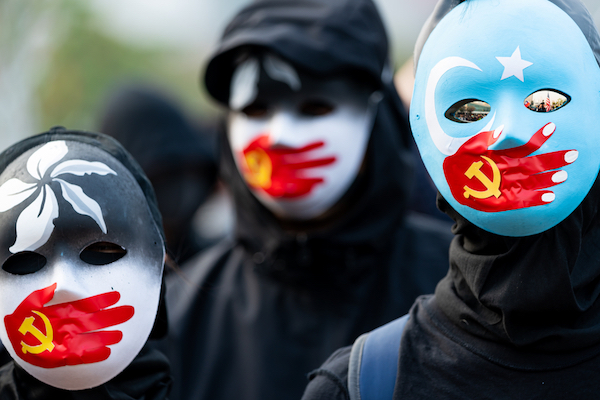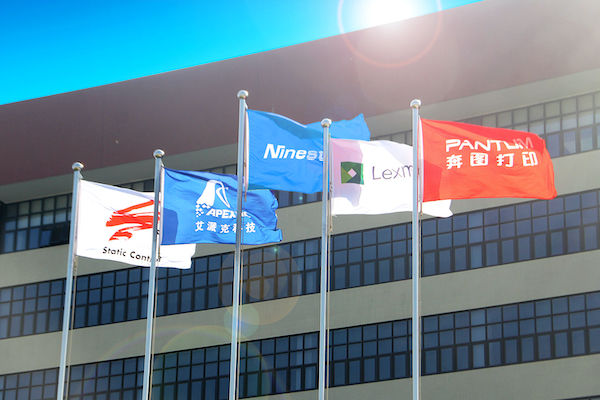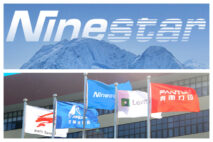On June 9, the United States Department of Homeland Security (DHS) announced that it would restrict the importation of goods produced by Ninestar Corporation and eight of its Zhuhai, China-based subsidiaries. The move came after the Forced Labor Enforcement Task Force (FLETF), which is led by DHS, added Ninestar to the Uyghur Forced Labor Prevention Act (UFLPA) Entity List “as a result of the companies’ participation in business practices that target members of persecuted groups, including Uyghur minorities” in China.

A group of protestors at a rally in Hong Kong wear masks symbolizing China’s silencing of Uyghur Muslims.
Ninestar and its subsidiaries along with one other unaffiliated firm, Xinjiang Zhongtai Chemical Co., Ltd., were the first companies to be added to the UFLPA Entity List since the U.S. Customs and Border Protection (CBP) began enforcing the UFLPA in June 2022. Companies placed on UFLPA Entity List are assumed to employ forced labor and are barred from shipping products to the United States, “unless the importer can prove, by clear and convincing evidence, the goods were not produced with forced labor.” According to the DHS, the embargo on Ninestar’s products is effective as of June 12.
Background
We offer the following overview to explain the UFLPA and what led to the act’s passage and implementation along with a response from the authorities in Xinjiang to some of the claims. Actionable Intelligence will not wade into the politics behind the policies espoused by the governments in the United States and the People’s Republic of China (PRC).
Signed into law in December 2021 by U.S. President Joe Biden, the UFLPA prohibits goods produced in China’s Xinjiang Uyghur Autonomous Region from being imported into the United States. It is assumed the goods produced in Xinjiang violate Section 307 of the Tariff Act of 1930, which prohibits the importation of any product made with forced labor. Organizations from around the world including the United Nations have determined that the use of forced labor is widespread in Xinjiang and hence the ban on goods from the region. Any claim of forced labor or mistreatment of Uyghurs is flatly rejected by the PRC government.
With a Uyghur population of approximately 12 million, Xinjiang has the largest concentration of this minority group, which is largely Sunni Muslim. According to a report released in January by the Congressional Research Service (CRS), a group within the U.S. Library of Congress, Uyghurs along with other ethic Muslim groups are routinely detained in so-called reeducation centers to assimilate China’s Muslims minorities into the Han Chinese majority.
The CRS explains that for more than a decade there has been ethnic unrest in Xinjiang and there have been reports of violence that has spilled outside of the province. A crackdown on what has been described as Uyghur terrorism by the authorities in Xinjiang coupled with the PRC’s broader “Sinicization” policy led to the abuse of Uyghurs and other Muslim groups. According to a U.S. State Department report released in June 2022, Uyghurs are subjected to severe physical, psychological, and sexual abuse as well as “forced labor, political indoctrination, and prolonged detention without trial.” Estimates of the number of Uyghurs held and abused in Chinese detention centers range from hundreds of thousands to more than a million.
As noted, the PRC government rejects the allegations of any abusive behavior on its part in Xinjiang. In its August 2022 report, “Fight against Terrorism and Extremism in Xinjiang: Truth and Facts,” the Information Office of the People’s Government of Xinjiang Uyghur Autonomous Region explains that for centuries “all the ethnic groups in Xinjiang embraced each other like pomegranate seeds.” Recently, however, the publication says that “anti-China forces in the US and the West” have “made up and spread numerous rumors and lies about Xinjiang.”
Pomegranate-seed analogy notwithstanding, the report goes on to say that “terrorist and extremist forces” are causing trouble in the region and “trampled on the basic human rights of all ethnic groups in Xinjiang.” It asserts that “the crimes are too heinous to forgive” and presents a long list of alleged violent acts. The report states, “It is imperative to maintain high pressure and take decisive measures to tackle the menace of violent terrorists.”
According to the report, “The anti-China forces in the US and some other Western countries frame Xinjiang’s fight against terrorism as ‘suppression of ethnic minorities,’ paint its de-radicalization efforts as ‘elimination of religion’ and ‘persecution of Muslims,’ and mischaracterize the law-based punishment of terrorists and extremists as ‘human rights violations.’” The report maintains that the “absurd logic” behind these claims is “driven by ulterior motives,” which were not stated.
What Ninestar Entities Are on the UFLPA List?
The DHS announcement indicating that products from Ninestar and its subsidiaries had been embargoed offered precious few details. Here’s what we know. Ninestar Corporation was added to the UFLPA Entity List on June 12, 2022, along with the following eight Zhuhai-based subsidiaries:
- Zhuhai Ninestar Information Technology Co. Ltd.;
- Zhuhai Pantum Electronics Co. Ltd.;
- Zhuhai Apex Microelectronics Co., Ltd.;
- Geehy Semiconductor Co., Ltd.;
- Zhuhai Pu-Tech Industrial Co., Ltd.;
- Zhuhai G&G Digital Technology Co., Ltd.;
- Zhuhai Seine Printing Technology Co., Ltd.; and
- Zhuhai Ninestar Management Co., Ltd.
Most of the companies, including Ninestar Corporation, are well known to Actionable Intelligence, and we write about many of these companies frequently. Ninestar Corporation is, of course, the world’s largest third-party supplies manufacturer in terms of both sales and unit shipments. In 2022, Ninestar reported its total revenue was CNY 25.85 billion—or about $3.7 billion (see “With Revenue and Profits Up Again in FY 2022, Ninestar Continues to Fire on All Cylinders”). The company markets products worldwide under the G&G brand. It is also one of the leading purveyors of ink and toner cartridges on Amazon in Europe, North America, and other regions selling products under a range of popular brands including Lemero and MyCartridge.
Zhuhai Seine Printing Technology Co. operates as a holding company and is listed in Ninestar’s 2022 annual report as its controlling shareholder with 28.96 percent of Ninestar’s shares. Seine Printing is run by Ninestar’s founder and chairman Wang Dongying, who is known in English-speaking countries as Jackson Wang. Along with Seine Printing Technology and Zhengfang Venture Capital, Zhuhai-based Gree Group, a large state-owned enterprise (SOE) owned by the Zhuhai government, recently established a venture capital fund that is expected to grow to CNY 800 million or almost $115 million (see “Gree and Ninestar Affiliate Form Fund to Support Zhuhai’s Chip, Printer, and Supplies Industries”).
The printer manufacturer Pantum Electronics is one of the world’s fastest-growing printer companies. Pantum recently became a wholly owned subsidiary of Ninestar Corporation (see “Ninestar Completes Acquisition of Pantum”) and broke ground on a new factory in Hefei, the capital of Anhui Province (see “Ninestar Holds Groundbreaking Event for Pantum Factory in Hefei”). While it does some business in the United States, Pantum is a leading printer vendor in Asia and its revenue totaled CNY 4.76 billion ($689.1 million) in FY 2022.
Apex Microelectronics was established as a subsidiary of Ninestar when the chipmaker was launched in 2004. The subsidiary, which is now the world’s largest supplier of semiconductors to the third-party supplies industry, announced last year that it had changed its name to Geehy (see “Apex Microelectronics Is Now Geehy Microelectronics”). More recently, Ninestar announced that it would spin off Geehy as a publicly listed company (see “Ninestar to Spin Off Geehy Microelectronics”). In FY 2022, Ninestar said that Geehy shipped 456.9 million chips and its revenue were CNY 1.93 billion ($279.1 million).
We were surprised to see Zhuhai Pu-Tech Industrial Co. named as a Ninestar subsidiary. Established in 2002, Pu-Tech is a supplier of toner cartridge components such as wiper blades and charge rollers to the third-party supplies industry. While we were aware that the firm supplied products to Ninestar’s Static Control Components subsidiary, which markets toners, drums, and other parts to remanufacturers in the Americas and Europe, we did not know Pu-Tech was a Ninestar subsidiary.
The role of several of the Ninestar subsidiaries named to UFLPA Entity List is not totally clear to us. Our research, however, allows us to posit a few educated guesses. Because it owns certain trademarks registered with the U.S. Patent and Trademark Office (USPTO) for brands sold on e-commerce platforms such as Amazon, Zhuhai Ninestar Management Co., Ltd. appears to be responsible for a portion of Ninestar’s online business. Filings made with the U.S. Federal Communication Commission indicate that Zhuhai Ninestar Information Technology is in part responsible for marketing hardware including label and electrophotographic printers in the United States.
Who’s Not on the List?
While the list of Ninestar firms no longer allowed to export to the U.S. is both lengthy and substantial, we noted that some of the firm’s most important subsidiaries like Lexmark avoided the ban. Ninestar is recognized as being a leader in the third-party supplies industry; however, the majority of its sales comes from its Lexmark International subsidiary. Contributing $2.3 billion, Lexmark’s sales represented about 63 percent of Ninestar’s total FY 2022 revenue.
Ninestar holds 62 percent of Lexmark, according to the Wall Street Journal (WSJ). The WSJ figure just about aligns with the one we have: In 2022, Ninestar announced it was increasing its stake in Lexmark to 63.04 percent (see “Ninestar to Increase Its Stake in Lexmark”). A Lexmark representative told the WSJ that the firm does not “anticipate business disruption” due to the embargo but did not respond to a question as to whether Lexmark sources printers from Ninestar.
The non-answer to the WSJ’s question about Lexmark’s sourcing may become critical. While we know that Lexmark continues to do production in Mexico, a significant amount of manufacturing has shifted to Zhuhai since the firm was acquired by Ninestar. In 2019, Ninestar said it would invest CNY 9 billion ($1.3 billion) in a Zhuhai printer factory, capable of producing 4 million printers annually (see “Ninestar Discusses Lexmark Loans and Printer Production Plant”). Given Ninestar’s current status, it seems reasonable that products from this factory are now at risk of being banned.
We are also aware of a recent ruling from U.S. Customs and Border Protection (CBP) indicating that the country of origin marking for certain Lexmark devices is now China and not Mexico because the printer subassemblies were coming from China. Whether those printer subassemblies were coming from Ninestar was something not addressed in CBP’s determination. We do not know what, if any, impact this decision will have on whether Lexmark devices could be subject to the embargo.
It was interesting to see that some of Ninestar’s Zhuhai-based cartridge-manufacturing subsidiaries were not placed on the UFLPA Entity List. In 2017, Ninestar acquired controlling interest in three major cartridge manufacturers: Zhuhai Zhongrun Jingjie Printing Technology Co, which trades under the Ink-Tank name; Zhuhai Xinwei Technology Co., Ltd., also known as Kingway; and Zhuhai Tuojia Technology Co., better known as Topjet. In 2020, Ink-Tank and Kingway became wholly owned Ninestar subsidiaries but Topjet remains jointly held. Of the three companies, Kingway and Topjet export products to the United States. Kingway shipments have fallen off over the past five years, but Topjet remains a leading exporter to the United States. To support Topjet’s business, we understand that Ninestar acquired a pair of related companies—E-Z Ink Inc. of Brooklyn, NY, and E-Jet Technologies Co., Ltd. of Zhuhai. Our research indicates that many products that these firms market are manufactured by Topjet. For Topjet and its affiliates, the ban on Apex/Geehy chips and Pu-Tech’s blades and rollers may prove problematic. It is our understanding that the use of these components within a finished cartridge will result in the product being banned in the United States.
Static Control Components is another Ninestar subsidiary that was not placed on the UFLPA Entity List. Regardless, it appears that the firm’s business could be dramatically impacted by the ban on products manufactured by Ninestar and its subsidiaries. While Static Control markets goods like toners and drums that are not produced by Ninestar companies, some of its most important products—chips—originate with Apex/Geehy and have been banned. Over the past decade, Static’s business has increasingly relied on the sale of finished toner cartridges, it supplies Xerox with a range of third-party SKUs, and it also offer a “Lexmark endorsed” line of third-party toner cartridges. Because those cartridges are produced by Ninestar in Zhuhai, they will no longer be allowed into the United States.
More Questions Than Answers
Like the rest of the industry, Actionable Intelligence was caught completely off-guard by news of Ninestar and its subsidiaries being placed on the UFLPA Entity List. Although we were aware of the law, it seemed to have little bearing on third-party cartridge manufacturers, which tend to be in coastal cities like Zhuhai and not in far western regions of China like Xinjiang.
As we noted earlier, the DHS announcement provided very little information, leaving us with more questions than answers. Of course, one of the big questions is how Ninestar and its subsidiaries were identified as violating the U.S. ban on products made with forced labor. Will other Chinese firms be added to the list, including any other Ninestar-controlled companies? We also wonder what Ninestar will do to survive. Europeans appeared concerned that the banned-from-the-U.S. companies will begin dumping products in Europe. The Recycler, a European website that caters to third-party supplies vendors in the region, warned that the ban on U.S. markets “cannot be overlooked as goods originally intended for the US market are likely to be redirected to other markets.” The Recycler goes on to say that there are calls for European Union member states to “prioritize buying European goods, thereby mitigating the potential negative effects of the US ban.”
We reached out to Ninestar to learn what the firm’s next step will be. Unfortunately, as of this writing, we have received no reply. The firm did release a short statement on June 12 acknowledging it was aware of the actions taken by DHS. According to the statement, which we read translated from Chinese, Ninestar has complied with “applicable standards of international labor protection and fully protects the legitimate rights and interests of laborers.” In addition, Ninestar said, it was “assessing the potential impact of this incident on the company” and “will issue further announcements if necessary.”
There are avenues companies can take to be removed from the UFLPA list. A post from DHS on the Federal Register website explains the procedure. Removal requests must be submitted to the FLETF Chair or the Chair’s designated representative. According to the site, “Following review of the removal request by the FLETF member agencies, the decision to remove an entity from the UFLPA Entity List will be made by majority vote of the FLETF member agencies.”
We expect to be writing much more about Ninestar and the UFLPA Entity List. As always, please feel free to contact us with your questions and comments and let us know how this news has impacted your business.
[UPDATE: Due to significant reader interest in this article, we have moved it from our Actionable Briefings section to Industry Insights so as to be in front of our paywall.]






